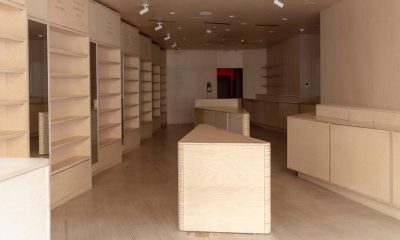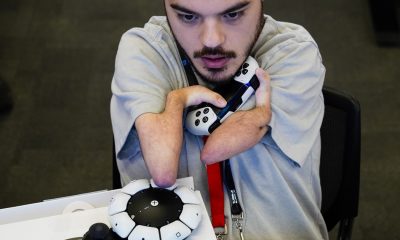Business
Young Chinese Embrace ‘Gross Outfits’ at Work

When the weather turned cold in December, Cindy Luo started to wear her fluffy pajamas over a hooded sweatshirt at the office. Wearing cozy sleepwear to work became a habit and soon she didn’t even bother to wear matching tops and bottoms, selecting whatever was most comfortable.
A few months later, she posted photos of herself to a “gross outfits at work” thread that had spread on Xiaohongshu, a Chinese app similar to Instagram. She was one of tens of thousands of young workers in China to proudly post pictures of themselves showing up at the office in onesies, sweatpants and sandals with socks. The just-rolled-out-of-bed look was shockingly casual for most Chinese workplaces.
“I just want to wear whatever I want,” said Ms. Luo, 30, an interior designer in Wuhan, a city in Hubei Province. “I just don’t think it’s worth spending money to dress up for work, since I’m just sitting there.”
Defying expectations for proper work attire reflects a growing aversion among China’s youth to a life of ambition and striving that marked the past few decades. As the country’s growth slows and promising opportunities recede, many young people are choosing instead to “lie flat,” a countercultural approach to seeking an easy and uncomplicated life. And now even those with steady jobs are staging a quiet protest.
The intentionally lackluster outfits became a social media movement when a user named “Kendou S-” posted a video last month on Douyin, the Chinese sibling service of TikTok. She showed off her work outfit: a fluffy brown sweater dress over plaid pajama pants with a pink, light-quilted jacket and furry slippers.
In the video, she said that her supervisor at work told her several times that her outfits were “gross” and that she needed to wear better clothes “to mind the image of the company.”
The video took off; it received more than 735,000 likes and was shared 1.4 million times. The hashtag “gross outfits at work” spread across multiple Chinese social media platforms and it unleashed a competition of whose work dress was the most repulsive. On Weibo, China’s version of X, the topic generated hundreds of millions of views and sparked a wider discussion about why young people are not willing to dress up for work nowadays.
“It’s the progress of the times,” said Xiao Xueping, a psychologist in Beijing. She said young people grew up in a relatively more inclusive environment than earlier generations and learned to put their own feelings first.
Mr. Xiao said the outfits may be a form of responsible protest, because people are still doing their jobs. It’s also a sign of how countries re-evaluate values and priorities when they reach higher levels of prosperity.
People’s Daily, the ruling Communist Party’s main newspaper, criticized young people for “lying flat” in a 2022 editorial, urging them to keep working hard. Since then, it has echoed the advice of Xi Jinping, China’s leader, who urged young people to “eat bitterness,” a colloquial expression that means to endure hardships.
But People’s Daily has refrained from scolding young Chinese for what it called “being ugly” at work. The publication said that the trend was a form of self-mockery, and that it was “unnecessary to magnify it to become a problem of principle” as long as the employees dressed appropriately and had a good work attitude.
Working from home during the pandemic changed workplace dynamics around the world. In the United States, many companies faced resistance to a return-to-office push, and the five-day-a-week commute is no longer a given at many companies. After three years of living under China’s stringent Covid restrictions, Chinese employees don’t mind going to the office — but many want to do so on their terms and in their comfy clothes.
Most of the responses to the “gross outfits at work” posts came from women. In China, like many places around the world, women are held to a higher standard for office wear, while men’s outfits often require less thought. For the almost entirely male top officials of the Chinese Communist Party, the choice of what to wear is pretty simple — “ting ju feng,” or “office and bureau style.” It’s the bland and understated look of a typical midlevel bureaucrat, a style preferred by Mr. Xi.
A colleague of Joeanna Chen, a 32-year-old translator at a beauty clinic in Hangzhou, posted pictures of her wardrobe to social media with the caption: “Guess how long it will take for the boss to speak to her?” (Ms. Chen’s colleague had her permission to post the photos.)
Ms. Chen was wearing a mango-yellow, hooded down overcoat with a white knit hat that covered her ears. On her arms were mismatched blue and beige sleeve covers adorned with cows. She wore black pants and pink-and-blue checkered socks with furry, granny-style loafers.
Ms. Chen said she recognized that the outfit, her usual office attire, wasn’t very stylish, but she didn’t care because it was comfortable. The sleeve covers were made by her grandmother. The sweater was a hand-me-down from her mother, and the hat once belonged to her son.
She said that her boss once asked her to wear something sexier to work, but that she had ignored his request. In addition, she has for the first time started to turn down work assignments she doesn’t want to do.
After going through years of unpredictable lockdowns, quarantines and the fears of getting sick during the pandemic, Ms. Chen said all she wanted now was to live in the moment with a stable job and a peaceful life. She is not worried about promotions or getting ahead.
“Just be happy every day and don’t impose things on yourself,” she said.
For Jessica Jiang, 36, who works in e-commerce sales at a clothing company in Shanghai, her “gross” look is more about her messy hair and lack of make up.
Ms. Jiang said she didn’t have enough time in the morning to get ready because of her hourlong commute. She said she dressed by throwing on clothes randomly. On a recent day, the result was a sweater that was too short to cover her thermal undershirt. “Everyone is focused on their work — no one cares about dressing up,” Ms. Jiang said. “It’s good enough to just get the work done.”
But Lulu Mei, 30, a bank clerk in the eastern city of Wuhu, said she had to wear a uniform everyday: a navy blue blazer, matching slacks and a button-down light-colored shirt. She said that without the requirement, she too might eventually stop dressing nicely because “all work is tiring.”
Ms. Luo, the interior designer who wears the fluffy pajamas to work, said there were days when she dressed more conventionally — like when going out with friends after work, or when her pajamas were in the laundry. She loves fashion, she said. At work, she listens to the runway music from the most recent Chanel show from Paris Fashion Week.
When she joined her company three years ago, she wore overcoats to look more mature and prepared her outfits the night before. Over time, she got tired of it and started to question the practice.
“I feel like I don’t know what I dress up for,” Ms. Luo said. “I just want to live a little more of my own way.”
Business
Taiwan, on China’s Doorstep, Is Dealing With TikTok Its Own Way

As it is in the United States, TikTok is popular in Taiwan, used by a quarter of the island’s 23 million residents.
People post videos of themselves shopping for trendy clothes, dressing up as video game characters and playing pranks on their roommates. Influencers share their choreographed dances and debate whether the sticky rice dumplings are better in Taiwan’s north or south.
Taiwanese users of TikTok, which is owned by the Chinese internet giant ByteDance, are also served the kind of pro-China content that the U.S. Congress cited as a reason it passed a law that could result in a ban of TikTok in America.
One recent example is a video showing a Republican congressman, Rob Wittman of Virginia, stoking fears that a vote for the ruling party in Taiwan’s January election would prompt a flood of American weapons to aid the island democracy in a possible conflict with China, which claims it as part of its territory. The video was flagged as fake by a fact-checking organization, and TikTok took it down.
About 80 miles from China’s coast, Taiwan is particularly exposed to the possibility of TikTok’s being used as a source of geopolitical propaganda. Taiwan has been bombarded with digital disinformation for decades, much of it traced back to China.
But unlike Congress, the government in Taiwan is not contemplating legislation that could end in a ban of TikTok.
Officials in Taiwan say the debate over TikTok is just one battle in a war against disinformation and foreign influence that the country has already been fighting for years.
Taiwan has built an arsenal of defenses, including a deep network of independent fact-checking organizations. There is a government ministry dedicated to digital affairs.
And Taiwan was early to label TikTok a national security threat. The government issued an executive order banning it from official devices in 2019, along with two other Chinese apps that play short videos: Douyin, which is also owned by ByteDance, and Xiaohongshu.
The political party that has governed Taiwan for the past eight years — and is set to do so for another four when Lai Ching-te is inaugurated as president on Monday — does not use the app, even during campaign season, over concerns about its data collection.
Here in Taiwan, lawmakers say, they do not have the luxury of thinking of TikTok as the only threat. Disinformation reaches Taiwanese internet users on every type of social media, from chat rooms to short videos.
“If you say you are targeting China, people will ask why we are not also talking about others,” said Puma Shen, a lawmaker from the ruling Democratic Progressive Party. “That’s why our strategy needs to be that we are regulating every social media platform, not just TikTok,” said Mr. Shen, formerly the head of Doublethink Lab, a disinformation research group in Taipei.
Taiwan has a deeply ingrained culture of free political speech, having taken the first steps to democracy only about three decades ago. Debate thrives across a huge variety of social media platforms, including on Taiwanese online forums, such as Dcard and Professional Technology Temple.
But the most widely used platforms have foreign owners, and TikTok is not the only one. YouTube, Facebook and Instagram, operated by publicly traded U.S. companies, are even more popular than TikTok in Taiwan. And Line, a messaging app owned by a Japanese subsidiary of the South Korean internet giant Naver, is commonly used in the country as a news source and way to make payments.
Legislators in Taiwan are considering measures that tackle internet threats — fraud, scams and cybercrime — broadly enough to apply to all these existing social media platforms, including TikTok, as well as whatever might replace them in the future.
One proposal introduced this month would require influential platforms that feature online advertising, which effectively encompasses all of them, to register a legal representative in Taiwan. Officials said these restrictions were not aimed at TikTok.
“We currently think that TikTok is a product that endangers national information security, but this designation does not target TikTok specifically,” said Lee Huai-jen, the departing spokesman for the Ministry of Digital Affairs. The ministry slapped the same classification on other Chinese short-video apps, including Douyin and Xiaohongshu, which have large audiences in China.
In March, executives from TikTok’s Singapore office met with government and political officials in Taiwan. The company talked with officials to “seek their feedback on our platform and for us to detail the many ways in which we keep our community safe,” a TikTok spokeswoman said. She added that the app’s data collection policies were in line with industry practices.
When Taiwan went to the polls in January, multiple organizations and government agencies were on call to make sure the conversation on TikTok stuck to the facts.
TikTok communicated with Taiwan’s election commission, police agency and interior ministry to flag potentially illegal content. TikTok said it had removed almost 1,500 videos for violating its policies on misinformation and election integrity, and took down a network of 21 accounts that were amplifying pro-China narratives. It also worked with a local fact-checking group to tag election-related videos with resources about misinformation.
But the day after the election, the website of the Taiwan Fact Check Center, a nongovernmental organization that works with tech companies including Google and Meta, was overwhelmed with thousands of visitors, according to its chief executive, Eve Chiu.
Many had seen videos on TikTok and YouTube showing volunteer poll workers making errors in the vote count and questioned the results of the election, Ms. Chiu said. Some of these videos were real, she added. The problem was that viewers were primed to think the scale of error was much larger than it was.
While Taiwan’s ruling political party did not use TikTok to campaign, its opponents, who are viewed with less antagonism by Beijing, did.
But some worry that this made it easier for pro-China views to spread on TikTok, and that Taiwan’s approach to regulating social media is not robust enough to confront the persistent threat of foreign influence online.
“In the U.S., the target is very clear — this one platform — but in Taiwan, we don’t know where the enemy is,” Ms. Chiu said. “It’s not just a cross-strait issue, but a domestic one.”
Business
Homes are demolished in Ivory Coast’s main city over alleged health concerns. Thousands are homeless

ABIDJAN, Ivory Coast (AP) — Dame Touré rushed to quickly gather what she could as bulldozers rolled into her neighborhood in Ivory Coast’s fast-growing economic hub of Abidjan. Her three children joined her, stuffing plastic bags with clothes and whatever other items they could grab, before their home was reduced to rubble as armed security forces looked on.
The Touré home was among hundreds crushed in a February wave of demolitions targeting Abidjan’s underdeveloped areas.
The government says it’s because of public health concerns as the poor areas — built along a lagoon in this port city of 6.3 million on West Africa’s southern coast — suffer deadly floods during the rainy season. More than 300 people have been killed since 2005 and officials say the deluges become breeding grounds for water-borne and other diseases.
“My children and I now sleep under the sun,” said Touré, 50. “We don’t know where to go.”
Demolitions in low-income neighborhoods are nothing new in Abidjan, where rapid urbanization has led to a population boom and housing shortages, with nearly one in five Ivorians residing in the city. It’s a challenge in many parts of Africa where economic woes pushed more people into cities in search of better opportunities, straining an already overstretched infrastructure.
However, the latest Abidjan demolition — mainly in impoverished suburbs in the Gesco and Sebroko districts — is one of the largest in years, with an estimated hundreds of thousands of residents affected since it began in late January. Evicted families and rights groups say that this time, it’s being done without prior notice or compensation.
Analysts say many African governments struggle to manage population explosions in cities and meet growing infrastructure needs. Chimezie Anajama, a policy researcher and founder of Blooming Social Pen development nonprofit, says few administrations have managed to solve the developmental problem.
“There must be a strong commitment by different African governments to come up with creative solutions to address the infrastructure gaps in African cities,” Anajama said.
Local authorities have defended the demolitions, and say relocations of families left homeless to safer areas has started.
Some 35% of Ivorians are poor. Water shortages are a daily curse, with many forced to fetch water from streams for their daily needs. The country has also had to contend with other challenges, such as jihadi attacks that have spread to coastal states in West Africa, including Ivory Coast.
“The aim is to provide a decent … living environment for these people,” the Ivory Coast’s communications minister, Amadou Coulibaly, has said of the demolition campaigns. He claimed in February that some of those evicted in neighborhoods like Boribana are being resettled in at least 1,000 houses built by the government.
Many families, however, remain homeless, stranded in several parts of the city.
The demolitions are being carried out in “a brutal manner … causing disastrous consequences for many families already vulnerable,” the Ivorian League for Human Rights said in a statement. It urged authorities to halt the campaign.
Among those affected by the demolitions were nearly 2,000 schoolchildren of Cha Hélène College in the Yopougon neighborhood, which was reduced to rubble in February.
The school was not informed it would be demolished — neither by the Ivory Coast’s ministry of construction nor the national education ministry, said Sévérin Okpo Abe, the school’s founder. The children were eventually enrolled in other nearby schools.
Most of the evicted residents who are not sleeping out in the open have either relocated to other parts of Ivory Coast or are squatting with residents elsewhere.
“We have been made homeless in our own country,” said Aimée Ouédraogo, a spokesperson for women affected by the forced evictions.
The evictions broke up families and the homeless were scattered across the city, she added. “We no longer have a home, we no longer have our family, we no longer have our children next to us.”
Amid the outrage and protest from the evicted, Ivory Coast President Alassane Ouattara has asked Abidjan’s local authorities to “show solidarity … to preserve cohesion and social peace.”
However, city’s officials say the demolitions are part of a broader project to reconstruct and provide basic amenities in the areas. Plots of land would be leased to those evicted for up to 25 years, for about $16 a month, they say.
On April 8, the government announced it’s started to compensate affected households and that each would get about $405 to support the relocation. In a country where the minimum wage is about $121 a month, some believe it’s not enough to afford the growing cost of housing.
“All displaced people will receive the necessary support for their relocation,” said Belmonde Dogo, the minister in charge of efforts to alleviate poverty.
The Yopougon municipality, mostly of working-class residents, also announced plans to help those affected.
But many like Touré say they were overwhelmed by helplessness watching bulldozers rampage through their neighborhoods.
“I don’t have anyone in Abidjan and I don’t have money to buy a house,” said the mother of three, not knowing how she would go on. “I can’t do it.”
___
Associated Press writer Chinedu Asadu in Abuja, Nigeria, contributed to this report.
___ The Associated Press receives financial support for global health and development coverage in Africa from the Bill & Melinda Gates Foundation Trust. The AP is solely responsible for all content. Find AP’s standards for working with philanthropies, a list of supporters and funded coverage areas at AP.org.
Business
Inside NPR, New Editing Layer Adds Angst Among Employees

One of NPR’s most prominent hosts asked the company’s top editor on Thursday to disclose the identity of an anonymous funder who is helping pay for a new layer of editing several weeks after the radio network faced a prominent accusation of having a liberal bias in its coverage.
Michel Martin, a host of NPR’s “Morning Edition,” pressed Edith Chapin, NPR’s chief content officer, to identify the source of the funding in an editorial meeting at the network’s Washington headquarters, according to four people with knowledge of the exchange.
Ms. Chapin declined to elaborate on the source of the money but said that it wouldn’t be a surprise to NPR’s editorial staff. Ms. Martin replied she would not accept that answer from a source, the people said.
The meeting was held to discuss the new layer of editing, called the Backstop, that was announced to the full staff on Wednesday. The group, to be made up of six senior editors, will review all of NPR’s journalism before it is released.
In recent weeks, NPR has been dealing with the fallout from an essay published in The Free Press by Uri Berliner, then a senior editor at NPR, who argued that the network had allowed progressive politics to skew its journalism. Much of the staff has pushed back against his accusations, calling them factually inaccurate, but conservative critics have latched onto his argument and Republican members of Congress have asked NPR’s chief executive to testify on accusations of bias.
The announcement of the new initiative angered many NPR employees, who see the Backstop as an unnecessary bottleneck that will bog down the nonprofit’s reporting with a redundant layer of editing. Others have expressed concern that it could be viewed as a defensive response to Mr. Berliner’s essay — a premise that Ms. Chapin has rejected in conversations with employees.
NPR declined to comment beyond Ms. Chapin’s note to employees. The note called the new changes — including periodic staff reviews of NPR’s ethics handbook — to ensure “that all our work meets the highest standards.” The initiative will also include an expansion of NPR’s standards and practices team, off-the-record editorial briefings with newsmakers and a content analysis of NPR’s journalism.
In a smaller staff meeting earlier in the week, Ms. Chapin said that the initiative was supported by Katherine Maher, the company’s chief executive, NPR’s board of directors and external funders, according to a person familiar with the exchange. She did not specify the source or amount of external financing, adding that she could not provide more specifics until the funding agreement was finalized.
When Ms. Chapin was asked in the meeting about how she would separate the decision to add a new editing layer from Mr. Berliner’s critique, she said that it was about journalism and that she felt lucky to get the additional resources.
“We ought to view that as a good thing,” Ms. Chapin said. “We’re not playing defense and having things imposed upon us that make zero sense and are put upon us by people who know less than zero about journalism.”
Another point of contention among NPR employees is the move to add a panel of editors less than a year after the company laid off roughly 10 percent of its staff.
But some NPR employees defended the decision to hire the editors. Eric Marrapodi, NPR’s vice president for news programming, said during the meeting that the new group of editors would be helpful for accuracy, though he also said he would have put the new resources to use in a different way.
Other news organizations have similar processes. CNN has a system called the Triad, a three-pronged internal review that includes close legal scrutiny.
Ms. Chapin said during the meeting that she would never allow a donor to dictate editorial terms. She has called the group a “new story sign-off process” that creates “a formal system to ensure that all of NPR’s content gets a final editorial review.” According to documents reviewed by The New York Times, the group will report to her.
-

 Tech7 months ago
Tech7 months agoBehind the Closing of Shen Beauty, a Brooklyn Boutique
-

 Tech7 months ago
Tech7 months agoHamas Seeds Violent Videos of Israel Attack on X and Telegram
-

 Top News7 months ago
Top News7 months agoACT test scores for US students drop to new 30-year low
-

 Top News7 months ago
Top News7 months agoFIFA Will Host 2030 World Cup on Three Continents
-

 Top News7 months ago
Top News7 months agoSony’s Access controller for the PlayStation aims to make gaming easier for people with disabilities
-

 Business7 months ago
Business7 months agoExxon Acquires Pioneer Natural Resources for $60 Billion
-

 Tech7 months ago
Tech7 months agoA Stairway to Nowhere Sells for $32,000 in London
-

 Top News7 months ago
Top News7 months agoIs Daniel Noboa the Answer to Ecuador’s Need for Change?



